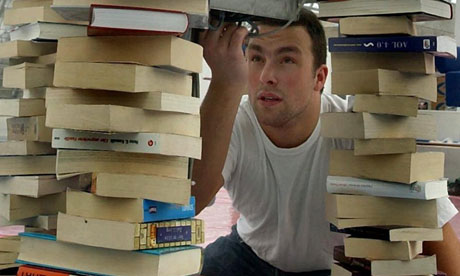First published on the Guardian book blog at http://www.guardian.co.uk/books/booksblog/2012/jun/20/book-fairs
Think of a second-hand fair and what comes into your mind? A church hall full of stoney-faced stallholders with tables of fusty goods? Chipped china plates, ancient bottles of bath oil and fraying cardigans?
You might not expect such events to survive in the age of Ebay, Amazon Marketplace and Gumtree, but the book fair, at least, is both surviving and thriving. Long-established fairs, such as the London Anarchist Book Fair, which has been running since 1983, are packing in stalls and visitors in greater numbers than ever before. And as the old ones grow, new special interest book fairs are springing up.
Last weekend saw the launch of a new comic book fair in East London's Shoreditch, organised as part of the East London Comics and Art Festival. September will see the Free Verse Poetry Book Fair return to London after a successful trial run in 2011. Their first fair contained 23 stalls hosting poetry publishers large and small. This year over 30 publishers are involved, and a programme of readings, events and free publications is being planned for the day, with the aid of Arts Council funding.
And it isn't just London that's gone book fair-crazy. The York Book Fair(established 1974) has grown from its 20-stall origins in a pub to packing out York Racecourse with 100,000 rare and antiquarian books, while Sheffield will play host later this month to the Sheffield Anarchist Book Fair, an affiliate of the long-established London fair.
Just what is it that's making these fairs so successful, at a time when conventional second-hand bookshops are closing down? Part of the appeal is that book fairs offer up books as tactile objects for leisurely perusal at a time when readers are increasingly doing their reading on e-readers and online. Potential purchasers can feel the heft, the quality of the paper - and in the case of second-hand books, look for intriguing dedications in the back. What's more, they can do this in the presence of knowledgeable publishers and booksellers - which is why books and pamphlets with beautiful illustrations or high production values are often to be found at book fairs.
Of course, this still doesn't explain why fairs should succeed where second-hand bookshops struggle - but perhaps the answer to lies in the sociability of browsing. A book fair is not just a static location - it is an event. More often than not it includes guest speakers, workshops and poetry readings. Visitors can mingle, meet friends and form acquaintances with others who have similar literary or political interests.
It is a book-selling formula which is proving so popular that Charles Boyle (organiser of the Free Verse Poetry Book Fair) is considering purchasing a van and taking a travelling book fair with a quirky selection of books all around the country - in a bookbuyers' answer to the endangered travelling library.
Have you made any great buys at book fairs, or visited any you would recommend (or otherwise)? Let us know.

